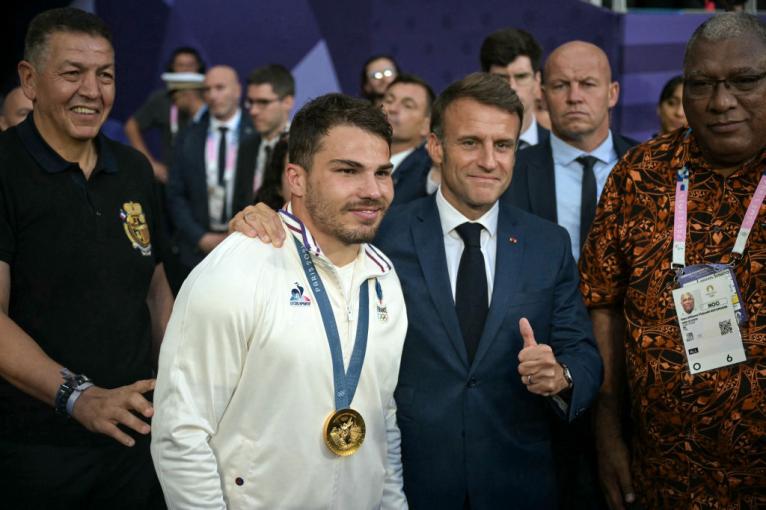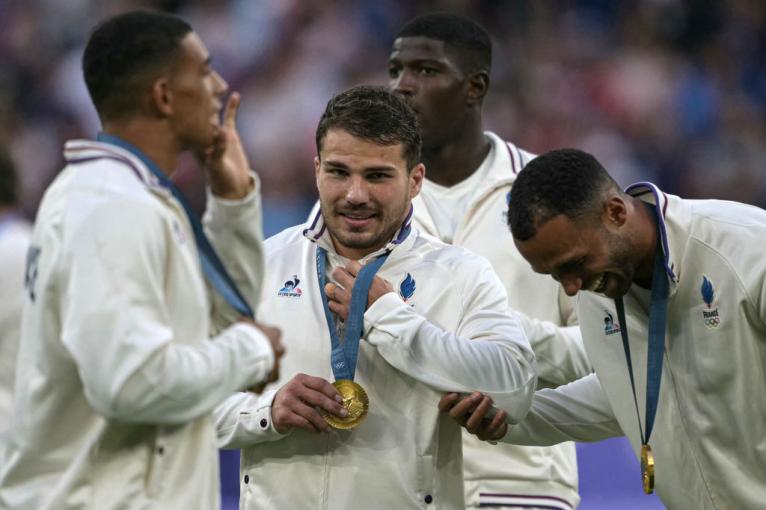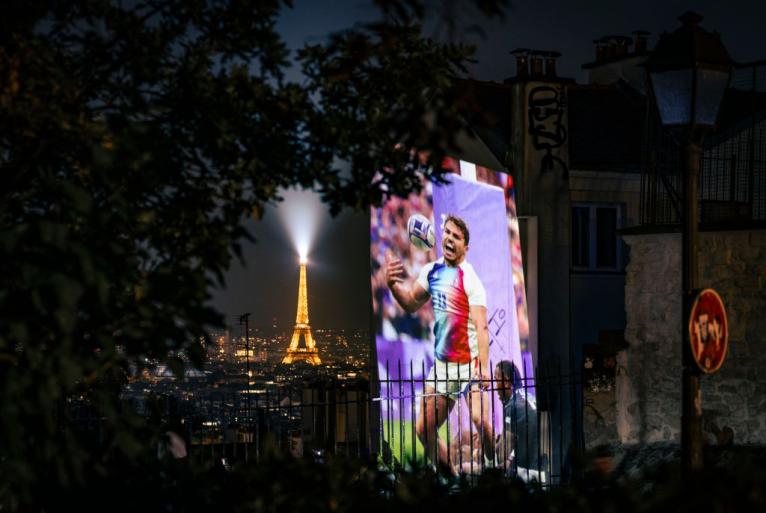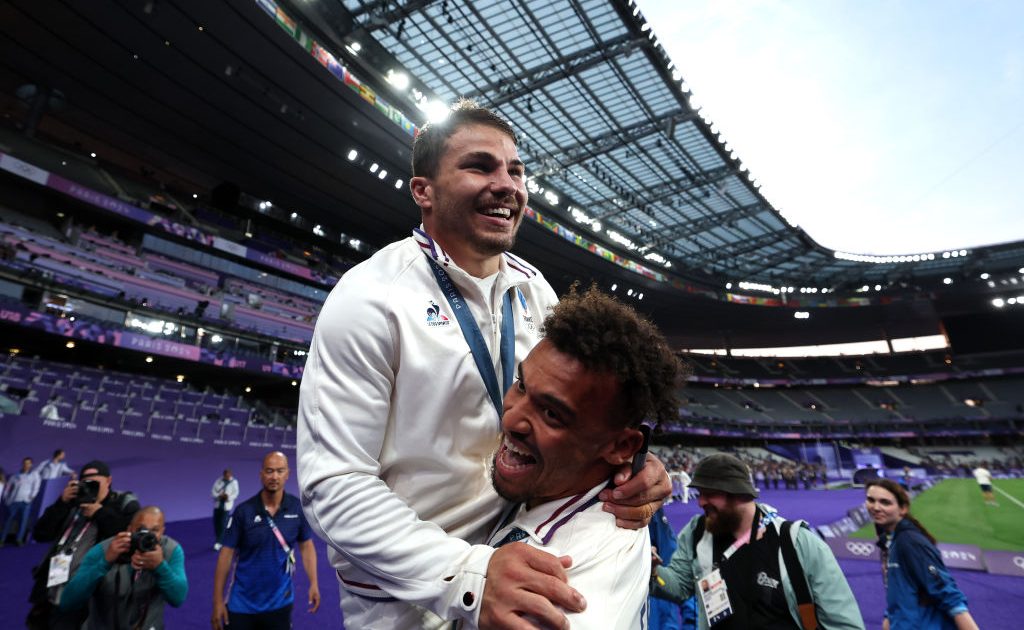In Antoine Dupont rugby once again has a superstar

Not content with any normal coronation, Antoine Dupont ascended the Olympic throne and carried a nation with him.
Sometimes, in the clutch moments of a contest, greatness announces itself, immaculate and irresistible and blindingly stark. A great player simply seizes a match and wrenches it beyond the control of their opponent.
The Olympic final was level at half-time, dangling in the balance. Fiji popped the cacophonous Stade de France with the first try, before Jefferson Lee Joseph brought the din soaring back up with a leveller.
Then, he emerged. All week, we had watched the Stade salivating over Dupont, practically begging Jerome Daret, the wily French coach, to unleash him from the bench where he starts almost every match for the national sevens side. We felt the jolt of electricity which surged through the place when Dupont stood up from the dugout, shed his bib and began whirling his muscular shoulders, scurrying up and down the touchline. The saviour cometh. Salvation is nigh.
Daret is careful to manage Dupont. He seldom plays more than the final five minutes, introduced for the magnificent Stephen Parez, whose influence burned bright on each of the three mesmerising matchdays. That’s the thing about greatness; it needs no time to bed in, nor dry runs to calculate; it strikes in bright flashes, pure and untouchable.
When Dupont finds the ball, the Stade goes thermonuclear. When he scorched down the left flank, burning the iconic Jerry Tuwai, the frenzied cry could be heard from outer space. Dupont flipped beautifully back inside for Aaron Grandider to cross. Then he powered over, bull-like thighs dragging helpless aggressors to his will.
This was Fiji. Tuwai’s Fiji. Osea Kolinisau’s Fiji. The Fiji who crave Olympic gold above all else. The Fiji who have defined and dominated rugby sevens, upon whose style the French themselves have based their blueprint. The swaggering superpower which had never lost an Olympic match in seventeen attempts. Fiji, turned to rubble by the French crusader.
As the Stade heaved and shuddered and bayed for the final whistle, the Fijians wore thousand-yard stares. Gold faded to silver. Even their sorcerer’s hands could not contain Dupont.
The game was won before he scored again on the final play, France’s fourth try adding an emphatic edge to scoreline and Dupont’s awesome personal role in it. This is how it was with Dupont all week; never sated by the ordinary.
In a tempestuous quarter-final against Argentina – viciously booed every match – France had a penalty with the clock red and the game won. There was no practical benefit to playing any further. Almost every sane player would hoof the ball off the field, bask in the glory and hop in the ice bath. Dupont wanted to ram home the point; he yearned to crank up the heat in this broiling cauldron one more time. He tapped, darted and then leapt over the line. The Stade rose to a guttural crescendo. Dupont bellowed right back. This is our stage. This is our time – my time.
Perhaps some of this stems from the year Dupont’s had, a near-twelve-month odyssey with expectation and scrutiny at every turn. He played his first match of the season on 12th August. He played 27 XVs matches for Toulouse and France and three sevens tournaments. His destiny was to captain France to the Rugby World Cup in their own back yard. He got a mashed-in face and a quarter-final exit instead. French rugby entered a weird state of mourning. Dupont abandoned the Six Nations to chase the Olympic dream. This – the euphoria and the pride and the wonderful circumstance – was a salving of the wounds.
Dupont has now played in nine finals and won them all. In the past two months alone, he has claimed an Investec Champions Cup crown, Top 14 title, HSBC SVNS Grand Final and Olympic gold medal. He was player of the match in three of those showpiece games. Greatness is not defined simply by tangible success, but by the unremitting capacity to thrive in the clutch moments.
Sports fans, above all else, need idols to worship. Dupont has become a totem for the French people. The game has not created a transcendent star for an age but he has that power now. He can be revered as Platini or Zidane or Mbappe. His face will be plastered across front pages the length and breadth of Europe today; his tries clipped up on news channels around the world; his status elevated beyond rugby player to sporting superstar. A picture of Dupont mocked up as the French president did big numbers on social media. The Games can turbocharge an athlete’s rise to real public renown. Everyone wants a piece of Dupont now, and not just in his chosen sport. The media scrum to get within a ten-yard radius of the phenomenon was like feeding time at a crocodile enclosure.

By contrast, there were no journalists waiting for Fiji as they paced through the written press mixed zone. They have contributed mightily to another immense spectacle. Kolinisau, captain in the inaugural Games triumph of 2016, took charge only five months ago and resurrected a programme which had become mired in rancour. Tuwai was out in the cold, reportedly deemed unfit by previous incumbent Ben Gollings. Kolinisau worked his boys hard and at 35, after a year in the wilderness, brought Tuwai back in to lead the Olympic charge. Tearing up in his press conference, the captain confirmed he is unlikely to play for Fiji again.
“Jerry leaves footprints in the sand for other boys to follow,” Kolinisau said of his old friend. “After he is gone, I think we are going to see there is only one Jerry Tuwai.”
Will Dupont be tempted back by another tilt at gold in four years’ time? Who knows what he might add to his ten major trophies and six individual honours by then. France are a fine team without him, of course. Parez is the perfect opener to Dupont’s ruthless closing routine. Andy Timo is a powerhouse and still just 20; Joseph a weapon and Aaron Grandidier a true showstopper.
Grandidier is a magnetic character. He was born and raised in London and to an English father and French mother. At 19, with no Premiership contract in the offing, he took a leap of faith and went to Brive. Now he’s an Olympic champion. Grandidier was outrageously good this week; a compelling advocate for sevens off the pitch and a try-scoring demon on it. He never missed an opportunity to express himself, never failed to whip up the feverish crowd or let the world know exactly what he felt. Boy does rugby need more of that.
“This is staying on my neck for as long as possible,” he proclaimed post-match, cradling his precious hunk of gold. “I’m gonna go out with it on, I’m gonna sleep with it on, I’m gonna travel with it on, I’m gonna go on holiday with it on, it is staying glued to my neck. Look at it!”

Most sevens players had never experienced such a sense-scrambling racket. Grandidier has spoken long and loud about the fabulous appeal of the sport and those who play it.
“I really hope that with the amount of people we’ve brought to the stadium, that people now start to appreciate rugby sevens for what it is. It’s such an incredible discipline. It’s often been seen as the crazy bit of rugby, but this is a genuine, serious competition with incredible athletes.”
The magic of the Stade cannot be recreated. It was a unique maelstrom of emotion and fervour with a God-like figure at its core. The challenge for rugby, perennially struggling for relevance beyond its traditional territories, is to harness this tsunami of Olympic joy. How can it be leveraged? What impact can it make in the United States, China or India?
The men’s sevens’ position in the schedule caused some angst, slated as two of its three days were before the Games proper began, before Celine Dion and the floats on the Seine. In reality, it provided a spotlight away from the blue-riband events. No jousting for eyeballs with athletics or swimming. In fact, very little sport and virtually no medal events to compete with at all. The venerable faces from all the major UK broadsheets were in attendance. Eurosport sent leading pundits Ugo Monye and Ben Kay to cover the pitchside beat. The sevens had a prime-time slot free to air on NBC; a golden opportunity to enchant millions of new viewers. There were even murmurs those organising the next Games in LA and Melbourne are hastily rethinking their choice of sevens venues. ‘We’re gonna need a bigger boat.’

Come the endgame, when the title was claimed and the Stade combusted, the sun pierced the clouds, as though Dupont himself had banished the rain which drizzled down all day across Paris. Edith Piaf pealed out and 69,000 sang the refrain: je ne regrette rien. Dupont can harbour no regrets about his own path. The French players, who had taken dance lessons as part of their pre-Olympic training regime, jived and popped in a choreographed celebration on halfway. The masses hollered their rhythmic chant: qui ne saute pas n’est pas français. ‘He who does not jump is not French.’ The stands were a sea of oscillating bedlam. It was as near-perfect a sporting occasion as it is possible to imagine.
In Rio, rugby sevens was a sideshow. In covid-gripped Tokyo, no fans were in attendance. Now, this breathtaking sport and its immense athletes have arrived, carried on the back of an unassuming French boy who would be king.





























Nice for France to put a token 15s player on its winning 7s team...talk about a charity case
Du Pont is competent but needs a decade of performance at all levels of rugby to be considered great let alone of all time.
Choking at a Home World Cup does not make you great.
Winning a local club competition without beating all teams from the Southern Hemisphere makes you good in Europe.
Winning the 6 nations makes you good in the poor third cousin competition of the WRC and behind the TRC respectively.
Love or hate him George Gregan was a better halfback because his side won global tournaments.
Aaron Smith won one RWC, nine TRC’s (including three against against world champions)
Far de Klerk 2 RWC, 1 TRC.
AduP zero RWC semi finals, zero finals, one Olympic gold, one 6N.
Rugby is a team game and if your performance doesn’t win the team global 15’s tournaments you’re the greatest choker of all time.
Ask Justin Marshall, Ritchie Mo’unga or Johnny Sexton how that feels.
He may prove to be in the GOAT conversation eventually but he’s got to put some global test rugby tournament trophies in the cabinet.
AduP?!?! 😂 you guys compete on the most creative way to wrongly write the « choker’s » name. Hope you won’t need a decade to write it properly 🥲
Congratulations France awesome achievement and a wonderful occasion, I thought Dupont played his part very well in an excellent side, but we might just need to cool the jets a bit in crowning him the g.o.a,t. just yet, although he certainly joins the conversation with what he has achieved already. But (and someone please fact check me here), he still has a few notable achievements to check off the goat list. A world cup title at the top of the list, another International world player of the year title wouldn’t hurt, and a test series win in South Africa and New Zealand, would pretty much end the argument in his favor in my opinion.
There are plenty of other superstars out there; just because he won one medal does not make him the sole symbol of rugby. There is Ardie Savea, Josh van der Flier, Romain Ntamack, Ange Capuozzo, and Josua Tuisova.
Typical comment of someone who doesn't know much about the game. None of the players mentioned has both the versatility and efficiency of Dupont.